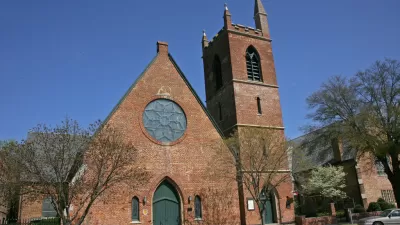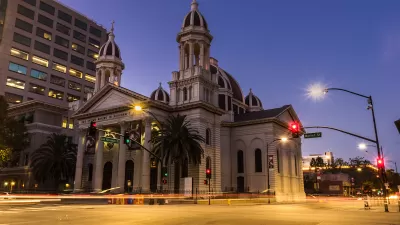A new report estimates that 171,000 acres of land would be available for housing development if California approves SB 4, Affordable Housing on Faith and Higher Education Lands Act of 2023.

A new report [pdf] from the Terner Center for Housing Innovation at the University of California, Berkeley estimates the housing potential for land owned by faith-based institutions if the state of California were to approve Senate Bill 4, the “Affordable Housing on Faith and Higher Education Lands Act of 2023,” under consideration in the state legislature.
SB 4, authored by State Senator Scott Wiener (D-San Francisco) would “provide a streamlined approval process and baseline development standards for affordable housing on properties owned by FBO and nonprofit colleges,” according to a description of the law provided in an article by David Garcia, Quinn Underriner, Muhammad Alameldin, and Issi Romem that shares insight into report.
As for the findings of the study, the authors explain: “In the paper, we find that these organizations own a significant amount of land that would be eligible for SB 4 incentives, and that could be used for affordable housing. Specifically, we identified over 171,000 potentially developable acres statewide owned by FBOs or nonprofit colleges, which is nearly five times the size of the city of Oakland.”
The report also provides recommendations for additional opportunities to encourage development on land owned by faith-based organizations.
The “Yes In God’s Backyard” movement has gained momentum in recent years with laws like SB 4 and efforts by churches to overcome local opposition to deliver affordable housing. Planetizen first shared news of California’s SB 4 in December 2022.
FULL STORY: The Housing Potential for Land Owned by Faith-Based Organizations and Colleges

Maui's Vacation Rental Debate Turns Ugly
Verbal attacks, misinformation campaigns and fistfights plague a high-stakes debate to convert thousands of vacation rentals into long-term housing.

Planetizen Federal Action Tracker
A weekly monitor of how Trump’s orders and actions are impacting planners and planning in America.

San Francisco Suspends Traffic Calming Amidst Record Deaths
Citing “a challenging fiscal landscape,” the city will cease the program on the heels of 42 traffic deaths, including 24 pedestrians.

Defunct Pittsburgh Power Plant to Become Residential Tower
A decommissioned steam heat plant will be redeveloped into almost 100 affordable housing units.

Trump Prompts Restructuring of Transportation Research Board in “Unprecedented Overreach”
The TRB has eliminated more than half of its committees including those focused on climate, equity, and cities.

Amtrak Rolls Out New Orleans to Alabama “Mardi Gras” Train
The new service will operate morning and evening departures between Mobile and New Orleans.
Urban Design for Planners 1: Software Tools
This six-course series explores essential urban design concepts using open source software and equips planners with the tools they need to participate fully in the urban design process.
Planning for Universal Design
Learn the tools for implementing Universal Design in planning regulations.
Heyer Gruel & Associates PA
JM Goldson LLC
Custer County Colorado
City of Camden Redevelopment Agency
City of Astoria
Transportation Research & Education Center (TREC) at Portland State University
Jefferson Parish Government
Camden Redevelopment Agency
City of Claremont





























